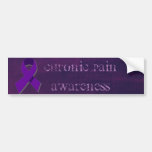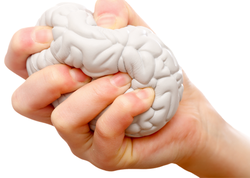Chronic pain affects many people, either directly or indirectly. If it's not something you suffer from, there is a good chance that it affects someone you care about. Christine Miserandino suffers from Lupus, and when out with a friend, she invented The Spoon Theory to help her friend see life better through her eyes.

Dealing with Chronic Pain: The Spoon Theory
by melanie_a917
Chronic pain can be extremely hard to explain to loved ones, but The Spoon Theory is an easy to understand breakdown.
I personally suffer from Fibromyalgia, along with a few other pain causing health problems. I have often been accused of faking it, or exaggerating. It is frustrating not being able to explain to people just how life feels from my end.
Then I found The Spoon Theory. I was in a support group on Facebook and someone linked to it. As I read it, I finally felt like someone understood. It wasn't long before I had my husband read it. I could see by looking at his face that he was finally starting to get it. The conversation we had afterward was a very emotional one.
I would advise everyone to read The Spoon Theory. It will help bring you some understanding, and possibly some new empathy toward people that have chronic pain disorders. In her Cafepress Store, you can find gifts to show your support to someone suffering, and posters of The Spoon Theory to hang up as a reminder.
Helping others understand isn't the only benefit. I've talked to people who have better realized how to manage their pain, or budget their spoons, and have improved their lives because of it. Being able to tell yourself it's alright to take a break, is a huge relief and can cut down on stress.
As someone who has dealt with this since I was thirteen, I can't express how painful disbelief can be. Being treated like a faker, and not being taken seriously, can sometimes be more painful than the physical pain caused by the health ailments. Having some support and understanding can go a long way toward changing someone's life.
When I'm going through a flare, there really isn't much my husband can do to get rid of my physical pain, but helping me realize that I don't have to feel guilty about taking it easy and focusing on not over doing it really does help a lot. I often try to force myself to do things I shouldn't to better take care of my three girls, so having someone telling me that they'll be just fine snuggling on the couch with me when I don't feel well is beneficial.
You might also like
How to Lower Cortisol Levels Reduce Stress Hormone and Improve...Cortisol is a steroid hormone regulating metabolism, the immune system and ai...
Walking Your Way to HealthThere is much research that shows that walking is beneficial to body and mind.






 Gift Ideas for Your Favorite English Teacheron 06/26/2017
Gift Ideas for Your Favorite English Teacheron 06/26/2017
 3 Tools for Simplifying Your Homeschool Dayon 02/16/2016
3 Tools for Simplifying Your Homeschool Dayon 02/16/2016
 The Importance of Keeping Memories Aliveon 07/21/2015
The Importance of Keeping Memories Aliveon 07/21/2015
 Best of Hyperbole and a Halfon 07/09/2015
Best of Hyperbole and a Halfon 07/09/2015


Comments
I read your blog, Very well explained, I greet each day with the hope it will be a good day. I try to get a lot done for fear it will turn to crap and so I have to take advantage of feeling normal as long as I do. Suddenly I hit a brick wall, literally it feels like I have been picked up by a giant and thrown into a brick wall as hard as the giant can throw me. Instantly I am stricken with intense and crippling pain making it so I can do nothing more but recover, be in the pain and look out at the world with sadness because once again I am not cured, healed,normal.
This is a lifesaver, I suffer with chronic pain, I did not until 6 years ago when in a serious car accident and suffered head trauma and spinal damage. Since that time I catch myself using the words, "I have a migraine or don't feel good, my back, neck and shoulders are killing me." I especially don't want to say this to my kids, family and friends. I fear they think I am weak, a liar or simply, as you said, making it up. Im joining the group today!!!!! Thanks
Sorry guys- this stuff is just so close to my heart. The first 18mos, the longest my rheumy would go without seeing me was every third month. Now he sees me either every month or every other month. It is a balancing game for those of us that are fighting day to day and have providers that are actually fighting along side us. I have had to shut out even family members who have seen me have episodes- like me playing with their kids one minute and then collapsing the next- they blame me for over medicating or whatever else they can come up with. Somehow, it's always my fault. I'm the asshole that they don't see me enough because I don't go over as much as I used to, or now when I say I'll go, I'm late all the time and I'm taking precious time away from them with my kids. And it's my fault they don't come here because my house is dirty. Yeah, well, you know what- if they were true family, they would offer to come over and help clean. But Karma and buses are waiting for folks just like my family members who are these people. And guess what? I suffer less flares, my teen suffers less breakouts, and my son has had many fewer nightmares. The proof is in the pudding. Plus, any of MY extra spoons- go directly to my kids and hubby. They say Lupus is incurable but it can supposedly go into remission. That's my goal, at minimum, remission.
Okay. Now, I'm done. Thank you all for the opportunity to share my story. Oh, question, has anyone else developed an aversion to waiting rooms like I have now? I used to be patient, reasonable and cool, almost no matter where I was, but now I try to see my doctors as little as possible because I cannot tolerate waiting rooms! Grrrrrr!
I have a host of nasty autoimmune diseases. It took several years for my diagnoses to come about and a new primary doctor. In my first visit with the new primary, he ran a blood test that was something he called an "ANA test", but he didn't mention it to me at the time. On the first day of February 2013, I returned to him for my results, and he tried to explain to me what his findings were. He explained that the test he ran was the test they use to screen and help diagnose diseases such as Rheumatoid Arthritis, Mixed Connective Tissue Disease and Lupus, to name a few. The disease that showed up possibly positive for me was Lupus. He asked me if I had ever heard of it before, which I hadn't. He asked me if I had a family history of it, which I didn't think so. Then after more discussion, I told him I had a grandmother that suffered from RA so badly, that she had lost the ability to walk due to the severity of the arthritis in her knees and the failed surgeries. Also, her fingers and toes were gnarled as a result of the Rheumatoid Arthritis, as well. Apparently, everything that would be tested on a Complete Blood Count (CBC) is different from the additional blood test he did. This is how he bested the other doctor I had seen in the past, even though that doctor had sent me to every possible specialist, with the exception of a rheumatologist. The name of the test he ran is called an ANA-test or Antinuclear Antibody Test. This test is performed a very special way in the lab and I recommend Googling it if you are suffering from chronic pain without a diagnosis and/or if you have any known type of autoimmune condition that runs in your family- I strongly recommend that you insist that your doctor perform one as soon as possible. The results come in the form of a ratio (again-tough to explain, so please read up yourself) and mine were just at the mark of being positive. So, that day he referred me to a rheumatologist and sent me home with some pain killers to try and help manage the pain that I had been complaining about from the moment he met me. On the last day of the month, I had my first appointment with my new rheumy. Almost immediately, or so it seemed, as he was examining me he spoke and said,"Well, I can tell you right now that you definitely have Fibromyalgia. As for the Lupus, I'm not so sure. I'll take your blood today and have my lab run it. Until then, let's discuss what meds you're on and what I think we should add or remove."
I hadn't heard of the spoon theory before, but now that I know about it. I will use it. Thanks
Would anyone mind to describe shortly what is a spoon theory without me needing to click and read around?
It's hard for others to empathize with those in pain if we don't "see" anything. The spoon theory is a good explanation.
I have ehlers danlos and deal with joint pain, severe random sharp pains, and alot of problems with my tissue. Being treated like a fake before I was diagnosed was the worst feeling. I still don't like going to the doctor for issues in fear I look like I'm faking it. I often feel that same guilt. I truly hope it gets better for you and you find ways to cope. People that understand and support you are the best to keep around. Same goes for doctors, although sometimes it is hard if they have limited knowledge about your condition.
This is totally new to me.
I first heard of the Spoon Theory years back, close to when it was first making rounds online, and yes, it's such a perfect analogy, a great way to explain the struggles of dealing with chronic illness and pain.